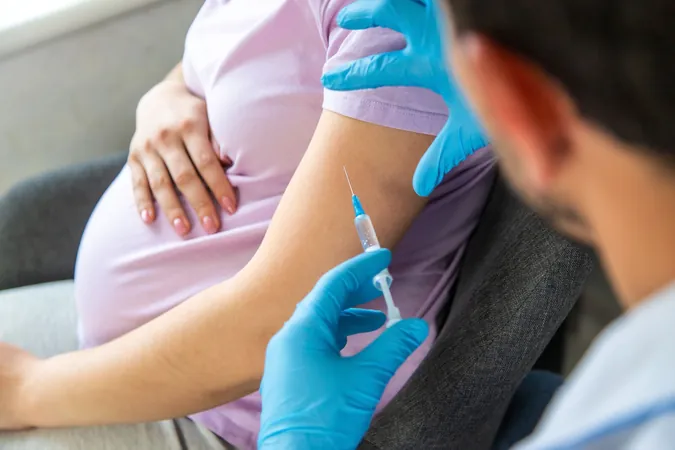
Surprising Disparities in Maternal RSV Vaccine Uptake Uncovered
2025-05-20
Author: Ming
Dramatic Differences in RSV Vaccine Uptake During Pregnancy
In an eye-opening revelation from the 2025 American College of Obstetricians and Gynecologists (ACOG) Annual Meeting, new data shows that the adoption rates of a life-saving maternal respiratory syncytial virus (RSV) vaccine are alarmingly inconsistent. During the first season post-launch, it became clear that socioeconomic factors play a critical role in whether pregnant individuals receive this crucial immunization.
The Study's Key Findings
A recent study analyzed data from 1,059 pregnant patients who delivered at a specialized medical center from October 2023 to March 2024. Pregnant individuals between 32 and 37 weeks were eligible for the RSV vaccine, which is vital in combating RSV—a leading cause of infant hospitalizations in the U.S. Alternatively, families had the option to choose a monoclonal antibody treatment for their newborns.
While 68.5% of participants received RSV protection, the outcomes were starkly different based on vaccination status. Those who opted for the maternal RSV vaccine had a significantly lower preterm delivery rate of 9.9%, compared to 17.8% among those who did not receive the vaccine (P < .001).
Insurance and Education: The Twin Barriers
Despite the high rates of overall vaccination, the study revealed that patients on Medicaid were less likely to receive RSV protection compared to those with commercial insurance—63.6% versus 71.3% (P = .037). This trend mirrored the acceptance of other critical prenatal vaccinations like Tdap and COVID-19—indicating a troubling link between social determinants and health outcomes.
Healthcare Providers' Confidence Issues
Further complicating the uptake issue, a survey of healthcare providers revealed a shocking lack of confidence regarding RSV vaccine education. Out of 72 obstetricians surveyed, only 19.05% felt "extremely familiar" with RSV. Furthermore, while 38.10% routinely discussed RSV vaccination with patients, 40% admitted to addressing it only sporadically.
Patient Awareness: A Critical Gap
Lack of patient education emerged as a significant barrier. Over 61% of providers cited insufficient awareness as a primary obstacle to vaccination, alongside concerns over vaccine safety and time constraints. Strikingly, nearly 38.10% of providers reported that a mere 0-20% of their patients were informed about RSV vaccination options before their appointments.
The Solution: Enhancing Communication
To tackle these challenges, an overwhelming 85.71% of providers expressed a need for educational materials like brochures to assist in their counseling efforts. Additionally, calls for improved online resources and structured training were prominent.
Cost Considerations and the Drive for Action
Financial factors also played a pivotal role in determining RSV vaccine accessibility. Survey participants noted that insurance often influenced patients' ability to receive the vaccine—a finding echoed in the study's data.
As healthcare professionals weigh various considerations, including vaccine safety and personal experiences with RSV, it’s become clear that proactive, informed discussions are crucial in improving vaccination rates.
Looking Ahead: A Call for System-Wide Change
The findings serve as a wake-up call to the healthcare community, emphasizing the urgent need for initiatives addressing educational gaps and insurance disparities. In understanding the dynamics of vaccine uptake, it becomes evident that enhancing communication and support could significantly increase RSV protection among vulnerable populations.





 Brasil (PT)
Brasil (PT)
 Canada (EN)
Canada (EN)
 Chile (ES)
Chile (ES)
 Česko (CS)
Česko (CS)
 대한민국 (KO)
대한민국 (KO)
 España (ES)
España (ES)
 France (FR)
France (FR)
 Hong Kong (EN)
Hong Kong (EN)
 Italia (IT)
Italia (IT)
 日本 (JA)
日本 (JA)
 Magyarország (HU)
Magyarország (HU)
 Norge (NO)
Norge (NO)
 Polska (PL)
Polska (PL)
 Schweiz (DE)
Schweiz (DE)
 Singapore (EN)
Singapore (EN)
 Sverige (SV)
Sverige (SV)
 Suomi (FI)
Suomi (FI)
 Türkiye (TR)
Türkiye (TR)
 الإمارات العربية المتحدة (AR)
الإمارات العربية المتحدة (AR)